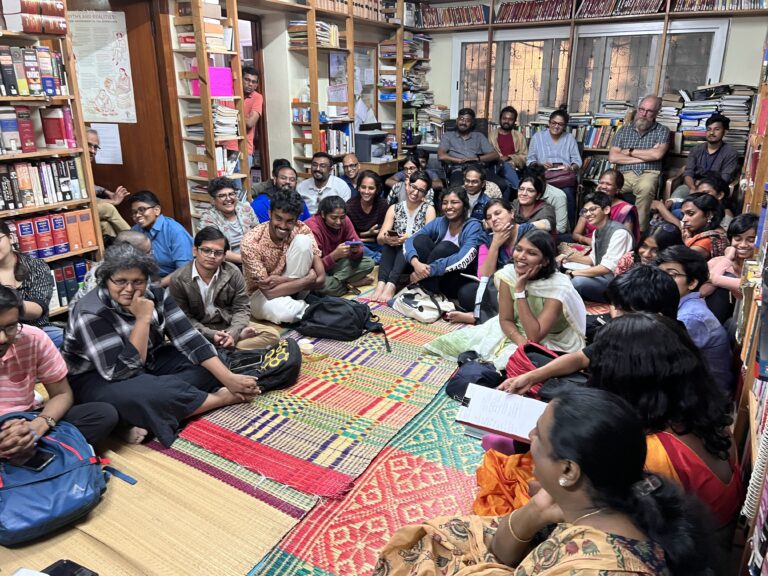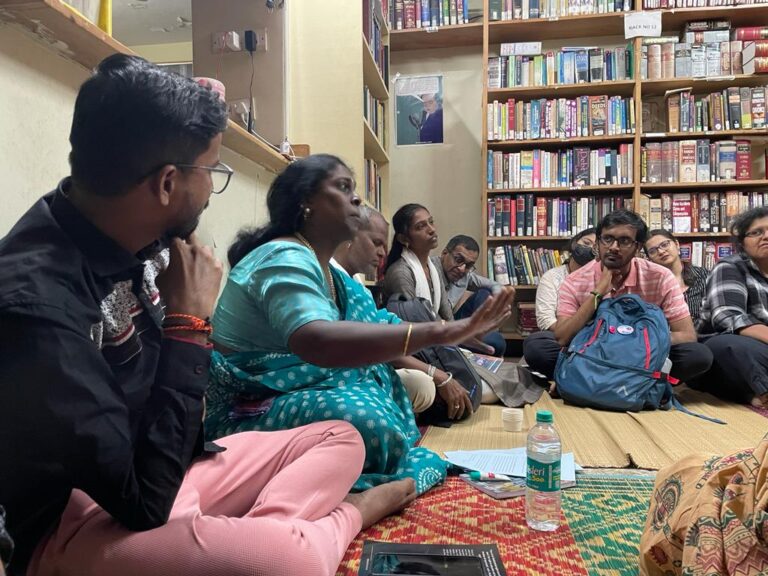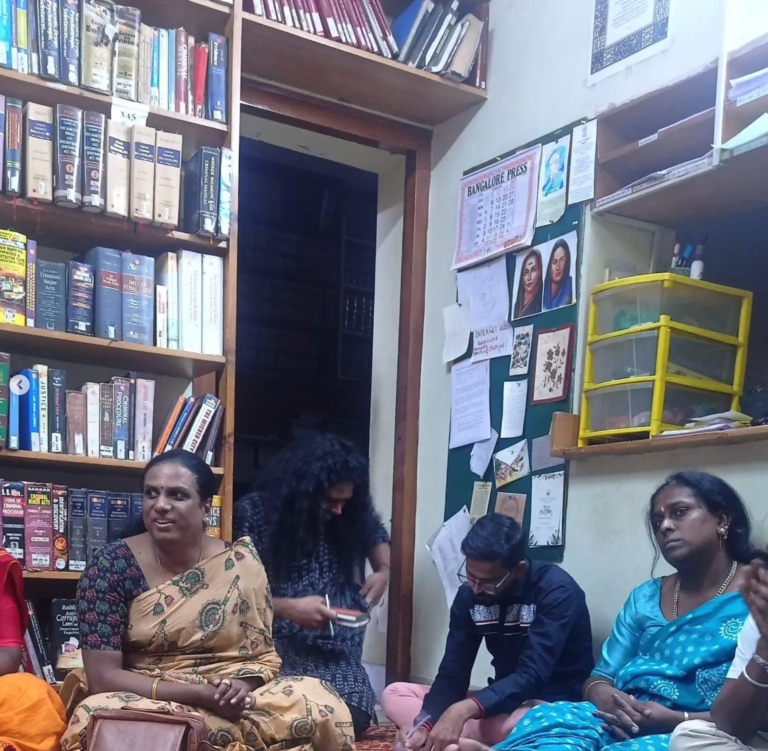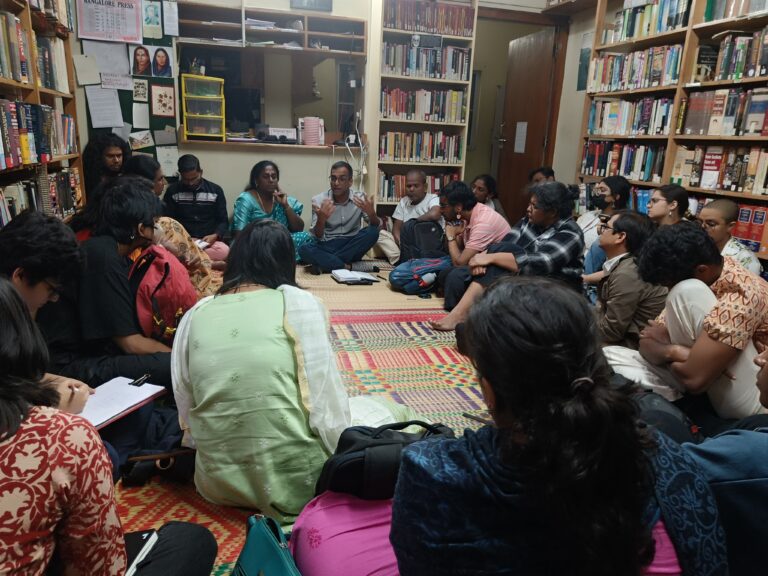QAMRA | 10th February 2023
QAMRA organized a collective deliberation on Marriage Equality with Bengaluru-based petitioners Akkai Padmashali and Uma, and legal scholar Arvind Narrain, at the Alternative Law Forum in Bengaluru on Friday, 10 February 2023.
The queer archive is committed to creating spaces where people may come together to speak about matters of contemporary concern.

Uma, Director of Jeeva, opened the discussion noting that the Indian state has recognized the importance of rights of transgender persons with regard to livelihood, law and education. She said it was time that the State also recognized how the denial of equality in marriage adversely impacts acceptance on a personal and social level.
Drawing on a historical perspective to explain why transactivists are asking for marriage equality, she reminded the group of the tragic circumstances of Chandni’s murder by her husband in 2002, where the police refused to register the case and recognize the relationship. Transpersons, she continued, could not nominate a partner for life insurance claims or for property, and she cited the low registration of such marriages under the Hindu Marriage Act. Further, Uma asserted that Marriage Equality is a matter of human rights. Denial of the right to marriage leads society to associate transpersons only with begging and sex work. While people may have different opinions on marriage, the social categories of spouses need to be available to all.
Akkai Padmashali, internationally recognized activist, made a bold and compelling case for Marriage Equality today. Firstly, she said, transgender communities have always been a part of Indian culture. She had earlier also submitted her demands before the Justice Verma Committee. She called upon Hon’ble Member of the Rajya Sabha, Sushil Kumar Modi, to make a public apology and retract his opposition to marriage for all persons. Marriage equality ought to be a right to be guaranteed to all individuals; the queer community is not here to beg, she asserted. Rather, it is the duty of the State to guarantee the enjoyment of rights to all its citizens. Besides, she reminded us, procreation is hardly the goal of sexual intercourse. With regard to religion, transcommunities have always been diverse. She also recognized that local government officials can also be supportive of registering marriages under the Special Marriages Act, but this needs to be a common guarantee in order for queer people to live a life of dignity.

Queer legal scholar and activist, Arvind Narrain, laid out the concerns as they appear in the petitions before the Supreme Court. Petitioners Supriya Chakrabarty and Abhay Dang faced a crisis when they fell ill during the Covid-19 pandemic- their long domestic relationship was not recognized by the medical institution. Other petitions call attention to the Special Marriage Act as well, which is a secular law and should ideally recognize all kinds of relationships. Arvind noted that the law needs to expand the provision of marriage to all ‘persons’. That would guarantee a queer partner all the rights which accrue from marriage. Where queer persons are excluded from the law, as one of the petitions puts it, ‘love is not enough’. This is brought home particularly in crisis situations. He also noted that merely ensuring that marriage includes all persons will not be enough, as the requirement of giving notice to the Registrar under the Special Marriage Act as well as giving the public a chance to file objections to the marriage, makes it almost impossible for people to use the SMA, especially in the case of objections by family and society. This requirement has also been challenged in some of the petitions filed.
Arvind also expanded the scope of the discussion to talk about the importance of legal precedents. He noted that the Navtej judgement has been cited over forty times in courts and 20 of the decisions extended protections to lesbian and transgender persons on the basis of Navtej. The case for same sex marriage also flows from the Puttaswamy judgment on privacy which recognizes that privacy includes the right to make autonomous decisions including the right to choose one’s partner regardless of sexual orientation or gender identity.

Discussion
There was a good deal of interest and the discussion was robust. Everyone felt the relative lack of spaces where such conversations can be had.
Someone asked whether the decision would come down to politics and the government line, though people felt that based on the past record, there is hope that the Bench will respond positively.
The question of polyamorous relationships was also raised – would the guarantee of marriage (between two persons) not deny the recognition of multiple relationships? One response to this was that such a community of love be created and recognition then sought. An American lawyer in the audience offered the case of California recognizing multiple relationships in terms of parenting. Another interesting case cited was from Colombia where the highest court ruled in favor of three men who lived together for 10 years.
The discussion also created space for people to share their personal experiences. Transpersons present made the case that marriage was important for them as it guaranteed a range of rights vis a vis their partner and
that they were with Akkai in the struggle. To a question about what would happen should there be a loss, Uma said “Namma horaata nirantara” – that our struggle will go on!
The evening ended on a lively, positive note where people listened to each other with empathy and solidarity. QAMRA is grateful to the Alternative Law Forum for co-organizing the event and for sharing their space!
